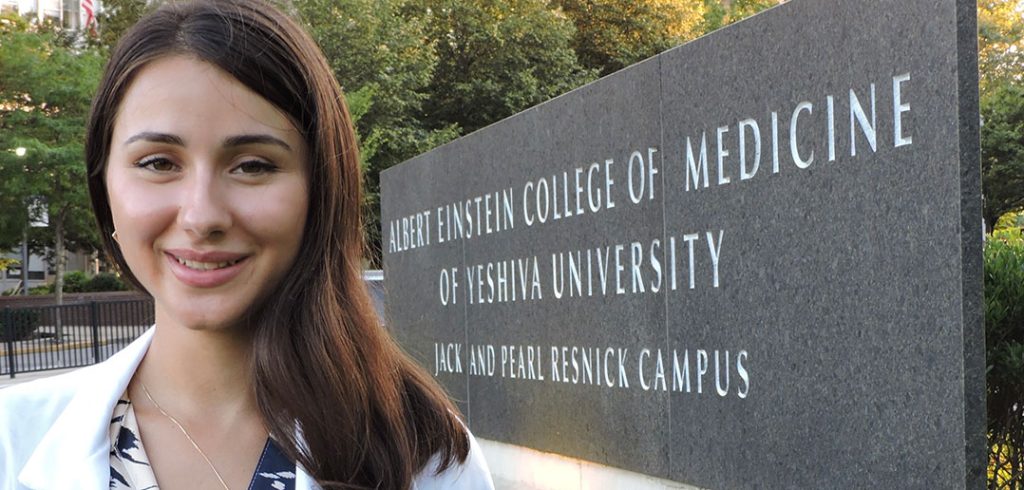A Visa lottery winner finds her path to medical school
Growing up in Albania, Sonola Burrja never imagined that she would move to Mamaroneck, New York, and study in the United States. But when her family won the U.S. government’s Diversity Immigrant Visa program lottery in 2018, the plan changed.
“The plan was that my younger brother and I get educated outside of Albania, which would probably result in our … not going back, [but]when we won the U.S. lottery, my parents saw it as a great opportunity for the entire family to stay together,” says Burrja, who graduated from Fordham College at Rose Hill in May.
Now, just five years after moving to New York, she’s a first-year student at Albert Einstein College of Medicine in the Bronx. And she can’t imagine not having gone to Fordham, where she joined the pre-health program, majored in biological sciences, minored in German, and was part of the University’s inaugural group of ASPIRES scholars. Partially supported by the National Science Foundation, the program—which stands for Achievement in STEM through a Program of Immersive Research Experience and Support—provides a select group of undergraduates with scholarships for their four years at Fordham, guidance in and out of the lab, and funding for their undergraduate research.
Conducting Ethical Research
Through ASPIRES, Burrja began collaborating with professors and conducting research almost right away—albeit not in the way she expected. It was March 2020, when COVID-19 spread to the United States, so her plan to conduct in-person research had to be put on hold in favor of a virtual research project.
“I was supposed to meet up with a researcher at Fordham that week that everything got shut down,” she recalls. Instead, she spent the summer working with Rachel Annunziato, Ph.D., a psychology professor and associate dean for strategic initiatives at Fordham College at Rose Hill, studying statistical data on diabetes and COVID-19 comorbidity.
Burrja went on to earn three undergraduate research grants from Fordham to support her work with biology professor Marija Kundakovic, Ph.D. She joined the Kundakovic Lab to study the epigenetic effects of hormones in female brains.
“I never knew that there were so many differences between female and male brains—and that somebody at Fordham was actually tackling this issue,” Burrja says, explaining why she asked Kundakovic to be her mentor. “I really thought it was very interesting because some conditions, for example, depression and anxiety, have a sex bias of females during their reproductive stage. There are some huge differences, and we still don’t know enough about this topic—and the brain generally is a very unexplored area.”
To help her navigate the ethical questions that need to be taken into consideration when conducting research, Burrja took Ethics and Research, a course that allowed her to “discuss some very difficult dilemmas” and think deeper “about some issues that don’t really come into our lives, but if you go into medicine or if you go into actually doing research, those issues might come up—and there are actual consequences to being on one side or the other.”
And they will come up: Burrja plans to become a doctor. She’s not yet sure what her specialty will be, but one thing in particular is a must.
“The patient interaction part is something that I would not want to sacrifice,” she says. “I would like to be able to speak with them and just be an advocate for them, especially working with underserved populations.”
Read more “20 in Their 20s” profiles.


